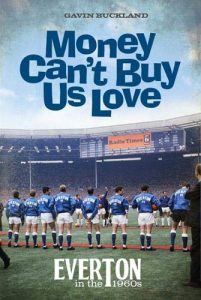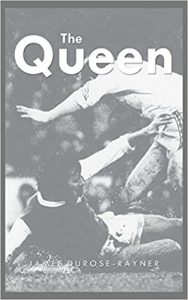Book Review: Money Can’t Buy Us Love: Everton in the 1960s by Gavin Buckland
 Gavin Buckland is Everton’s official statistician, so the book is almost certain to be factually accurate and it is clearly a labour of love for the author. So far so good. And, although it is possibly too detailed at times, it is an enjoyable read. Evertonians of a certain vintage will surely lap it up; a chronicle of a time when the club won two Championships and the FA Cup, an era when stars like Alan Ball and Alex Young were in their pomp. Plus a nostalgic look back to when Toffee fans led the country in smashing up football train specials…
Gavin Buckland is Everton’s official statistician, so the book is almost certain to be factually accurate and it is clearly a labour of love for the author. So far so good. And, although it is possibly too detailed at times, it is an enjoyable read. Evertonians of a certain vintage will surely lap it up; a chronicle of a time when the club won two Championships and the FA Cup, an era when stars like Alan Ball and Alex Young were in their pomp. Plus a nostalgic look back to when Toffee fans led the country in smashing up football train specials…
But the ‘so far so good’ point is that there is way too much detail for the less devoted fan and the book’s title is simply not accurate. When we reach the end of the 1960s, Buckland decides, since he’s enjoying himself so much, to simply keep going and we get not just the bonus of 1970 (which makes some sense as it is the completion of Everton’s second title winning season) but then 1971 sneaks in. Ok, room for one more, but what’s this? 1971 says, ‘Can my pal come, too?’ so we get 1972. And guess what? 1972 wants his pal so we get 1973 before finally calling a halt to the ‘sixties’.
There is some reason for all this. The central pivot of the book is the contribution made to the club’s success by chairman John Moores, founder of Littlewoods Pools, in combination with manager Harry Catterick. Each of them still wielded strong influence in the early years of the 1970s making a neat cut off point extra difficult. But this also brings another problem. The central premise is that Everton bought their success and it made them very unpopular, hence the title and word play on the Beatles’ hit ‘Can’t Buy Me Love’. The author clearly proves his case going into bagfuls of detail and quoting extensively from the press, especially the quality press. The second championship, centred on the famous ‘holy trinity’ of Ball, Howard Kendall and Colin Harvey. However, they were noted for the fine football they played and that central premise no longer holds true.
Trying to pour too much into a pint pot? For sure and I fear it therefore narrows the likely audience which is a shame because there are tons of really interesting stories and facts within, for instance the Football Bribes Scandal of the early sixties is dealt with expertly. Everton were the innocent victims of it as they lost a real star in Tony Kay who had accepted a bribe whilst still at Sheffield Wednesday and was banned from football for life.
There is plenty of gossip such as how the unhappy former goalkeeper Albert Dunlop alleged that Everton players tried to bribe the opposition. His case was not proven but they say some mud always sticks…
And first team coach Stewart Imlach earned himself a punch in the face for his dismissive treatment of misfit striker Bernie Wright. Not a good idea to treat a moody reject so badly then run past him in training, it seems.
Too many times, Buckland slips into straightforward reportage of game after game but his details of the battles fought out between Everton and Leeds United are fascinating and he tells with relish of the confrontations between two very hard men Jack Charlton and Johnny Morrissey. Among the excellent photographs is the famous one where the referee had to take both teams off the pitch to let things cool down. Former Everton hero (and another hard man) Bobbie Collins, by then at Leeds, and Everton’s Brian Labone are walking off side by side and Labone is literally head and shoulders above Collins. A great picture about a time in football that the author recounts pretty well. It deserves a wider audience because there is so much in the book to enjoy.
Graeme Garvey
(deCoubertin Books, August 2019 363pp)
 Queen of Cups is the final instalment of the trilogy that includes,
Queen of Cups is the final instalment of the trilogy that includes,